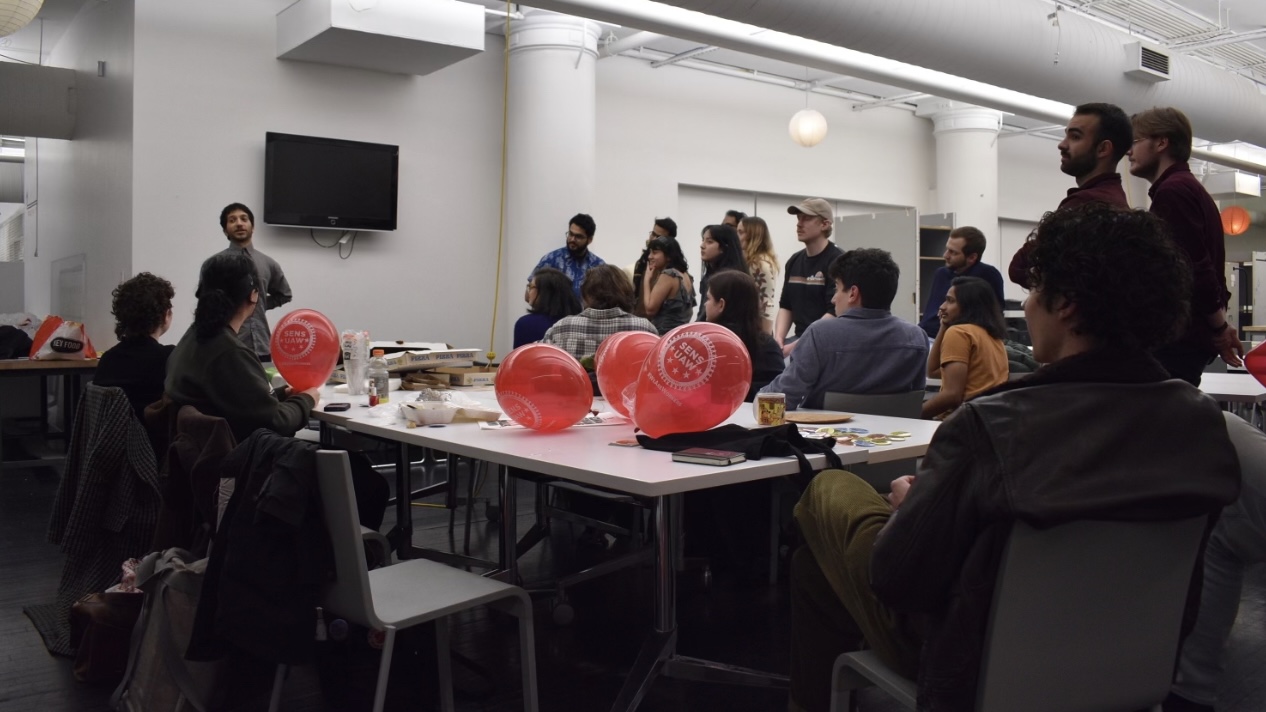With the SENS-UAW strike underway, there remains a wide gap between what the union and the university are offering in their most recent negotiations.
At last night’s bargaining session which ended around 5 a.m. this morning, new tentative agreements were reached regarding international student worker support and childcare, among other articles.
Despite long-awaited agreements on many economic and non-economic issues, the university and union remain in disagreement about healthcare provisions for academic student workers (ASWs).
The union’s most recent offer on healthcare provisions from March 6 at 1:45 a.m. proposes exemptions of student healthcare insurance premiums ranging from 55%, 70%, and 90% based on the number of years worked, regardless of degree level. “They’re proposing new, weird divisions that we don’t recognize because they don’t exist in our membership,” bargaining committee member Danielle Twiss said.
The university has offered an 80% discount on healthcare to all ASWs who are PhD candidates and a 55% or 70% discount to non-PhD academic post-grad workers, based on the number of semesters worked. The primary differences between the offers are the maximum discount of 90% from the union versus 80% from the university, and the distinctions made by the university between doctoral candidates and other degree programs.
The union said that this offer is insufficient, citing healthcare as their primary reason for going ahead with today’s strike. “The university is trying to divide the unit between Masters and PhDs, but we know that we are stronger together and that our members cannot be pitted against each other,” SENS said in a university-wide email today at 6:30 a.m.
For employee wages, the current contract proposal from the university is also unsatisfactory for union members. According to Twiss, the two parties are relatively close to an agreement on wages for ASWs. “They are below our bottom line, especially on RAs and TAs,” said Twiss, referencing the university’s wage offers for research assistants and associates, as well as teaching assistants. She went on to say that RAs make up a majority of union membership.
According to today’s SENS update, the university and the union have tentatively agreed on a legal assistance fund of $10,000 for international student workers.
The university has also agreed to explore the development of a rental guarantor program and consented to keep U.S. Immigration and Customs Enforcement (ICE) off campus, according to SENS messaging from this morning.
One of the big concerns the union has with the new contract is the explicit language regarding the university’s communication with ICE. “No ICE on campus outside of absolute legal necessity; and that the university will notify the union in case of an investigation without names, of course without a breach of information, but we’ll notify if this is happening again, or subject to legal language,” said Emmanuel Auerbach-Baidani, a SENS bargaining committee member.
In addition to support for international students, the parties have agreed to a $25,000 childcare fund and a $10,000 professional development fund for all ASWs, according to the union’s message. “I think they’ve made more movement than we’ve expected,” Twiss said about the university’s most recent offer.
The New Student Workers’ Union (NewSWU) is currently awaiting a decision from the National Labor Relations Board (NLRB) about whether they can hold an election to join SENS.
If the NLRB decides that an election should be conducted, NLRB Region 02 will hold an election including all NewSWU members, who would join SENS if the necessary majority is reached. Alternatively, the university can voluntarily recognize the union based on existing evidence.
Over the course of SENS negotiations, a side letter was floated by the UAW bargaining committee for both parties (union and university) to agree that they would not appeal the NLRB’s decision regarding NewSWU. If both parties agreed not to appeal, the NLRB’s decision on the matter would be final, expediting the process.
Over the course of last night’s negotiations, the bargaining committee determined that the university would not negotiate on this matter, leading SENS to take their letter off the table in the hopes of reaching an agreement, according to SENS bargaining committee member Aaron Berman. “They do not want to leave it up to the proper authority, the National Labor Relations Board, to determine whether or not these workers have democratic rights to decide about their representation,” Berman said.
Another important non-economic article that has yet to be agreed upon is the length of the new contract. “In the end, all they offered was one year off of their original language. So five years instead of six, which is a really long contract,” Twiss said.
Bargaining committee member Lenny Black said, “In my opinion, it is a union busting strategy, because this is a university, a union of students. Not all that many students are here for more than six years.”
“We told you where we were, what to do to get us avert a strike. And they weren’t able to do it,” Black said.







